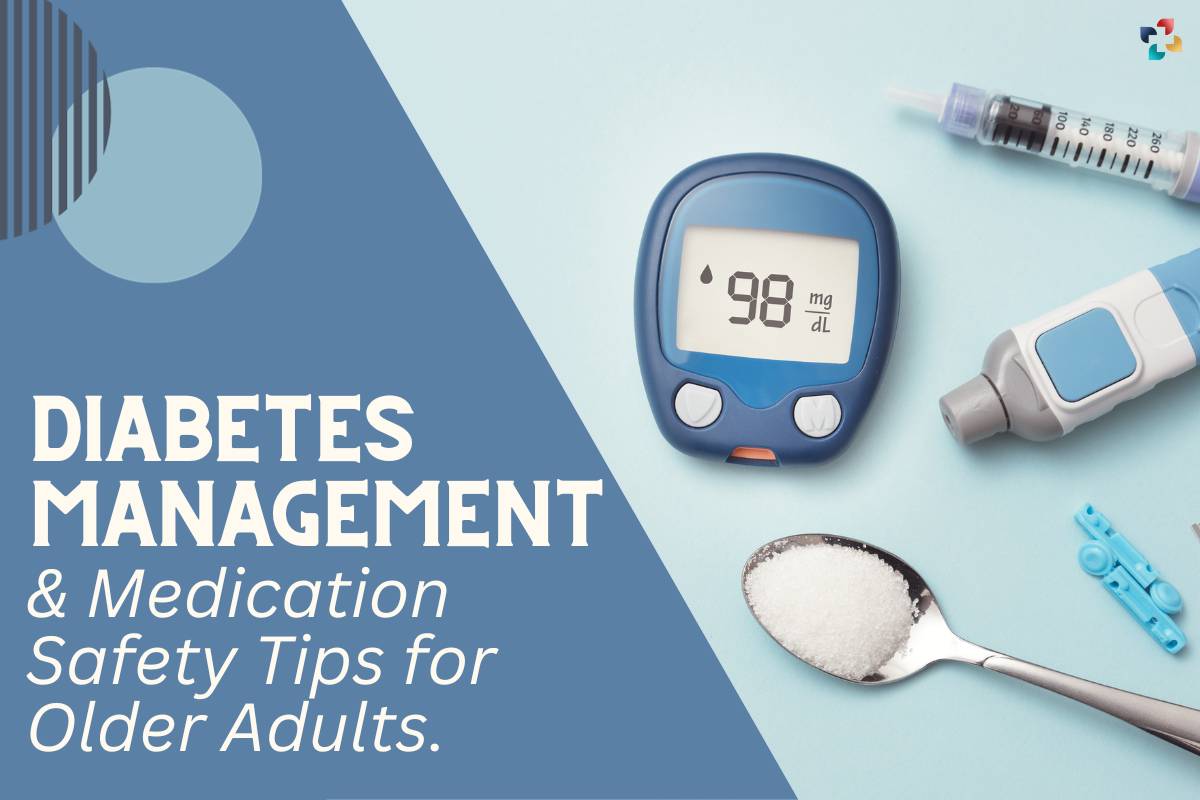The chronic medical condition of diabetes has affected millions of people worldwide in recent years. As one age, his/her risk of developing chronic diseases, especially diabetes increases. This makes for a prevalent health concern for many older adults.
To prevent any other kinds of complications that come with diabetes, one crucial aspect is to properly maintain the blood sugar levels for overall diabetes management. One of the most important things to keep diabetes in check is the medication and their timely consumption. However, it is a common observation that most older adults face difficulties when it comes to medication safety.
In this article, we will explore essential medication safety tips specifically tailored to older adults with diabetes to help them effectively manage their condition and lead healthy lives.
Understanding Diabetes in Older Adults
Diabetes is a metabolic disorder characterized by elevated blood sugar levels, resulting from the body’s inability to produce enough insulin (Type 1 diabetes) or effectively use insulin (Type 2 diabetes). Older adults are at a higher risk of developing Type 2 diabetes due to factors such as age-related insulin resistance, genetics, and lifestyle choices.
Managing diabetes in older age can be complex, as it often coexists with other health conditions such as high blood pressure, heart disease, and kidney problems. The following medication safety tips aim to assist older adults in navigating their diabetes management more effectively.
Communication with Healthcare Providers

Open and clear communication with healthcare providers is paramount in managing diabetes effectively. Older adults should:
- Inform their healthcare team about all medications, including over-the-counter (OTC) drugs, vitamins, and supplements they are taking.
- Discuss any changes in their health status, symptoms, or side effects experienced from diabetes medications.
- Ask questions and seek clarification regarding their diabetes medications and treatment plan.
- Schedule regular check-ups and follow-up appointments as recommended by their healthcare provider.
Here are 9 medication safety tips for older adults for diabetes management:
1. Medication Adherence
Medication adherence is essential for diabetes management. To ensure consistent adherence:
1. Set a daily routine
Taking medications at the same time each day can help establish a routine and reduce the risk of missed doses.
2. Use pill organizers
Organizers with compartments for each day of the week can help older adults keep track of their medications.
3. Consider medication synchronization
Pharmacies often offer medication synchronization services to align refill dates for multiple prescriptions.
4. Ask for simplified regimens
Talk to healthcare providers about simplified medication regimens to reduce the number of daily doses, if possible.
2. Medication Review and Management
Older adults should regularly review their medications with healthcare providers to ensure safety and effectiveness:
1. Conduct medication reviews
Periodically review the necessity of each medication with a healthcare provider, as some medications may no longer be needed or may interact with other drugs.
2. Be aware of side effects
Understand the potential side effects of diabetes medications and report any unusual symptoms to healthcare providers promptly.
3. Monitor for drug interactions
Some medications can interact negatively with each other, leading to adverse effects. It is crucial to notify healthcare providers of all medications being taken to prevent harmful interactions.
4. Consider medication de-prescribing
In some cases, healthcare providers may recommend reducing or discontinuing certain medications to simplify treatment and minimize potential side effects.
3. Proper Storage

Proper medication storage is vital for maintaining the effectiveness and safety of diabetes medications:
6. Store medications in a cool, dry place
Avoid exposure to extreme temperatures and humidity, which can affect the stability of medications.
7. Keep medications out of reach of children and pets
Ensure that medications are stored securely to prevent accidental ingestion.
8. Check expiration dates
Discard any expired medications and replace them with fresh supplies.
4. Medication Administration Techniques
Older adults should be aware of proper medication administration techniques:
1. Swallow whole when necessary
If a medication is meant to be taken as a whole tablet, do not crush or break it unless advised by a healthcare provider.
2. Use assistive devices
If experiencing difficulty swallowing pills, consider using a pill crusher or splitter or consult a healthcare provider for alternative dosage forms.
3. Follow dietary instructions
Some diabetes medications need to be taken with food, while others should be taken on an empty stomach. Ensure proper adherence to dietary instructions for each medication.
5. Blood Glucose Monitoring
Regular blood glucose monitoring is crucial for diabetes management. Older adults should:
1. Learn to use a glucometer
Familiarize themselves with the operation of a blood glucose monitoring device and follow recommended testing schedules.
2. Keep a log
Maintain a record of blood glucose readings to share with healthcare providers during appointments.
3. Know target ranges
Understand target blood glucose ranges and what readings indicate hypoglycemia (low blood sugar) or hyperglycemia (high blood sugar).
6. Hypoglycemia Awareness
Hypoglycemia, or low blood sugar, is a potential side effect of some diabetes medications. Older adults should:
1. Learn the signs and symptoms
Familiarize themselves with the signs of hypoglycemia, which may include shakiness, confusion, sweating, and dizziness.
2. Carry glucose sources
Keep a source of fast-acting carbohydrates (e.g., glucose tablets or gel) readily available to address low blood sugar episodes.
3. Wear a medical alert bracelet
Consider wearing a medical alert bracelet that indicates diabetes and the potential for hypoglycemia.
7. Regular Exercise and Balanced Diet
Physical activity and a balanced diet play a crucial role in diabetes management:
1. Follow dietary recommendations
Consume a diet rich in whole grains, fruits, vegetables, lean proteins, and healthy fats. Consult with a registered dietitian if needed.
2. Engage in regular exercise
Aim for physical activity as recommended by healthcare providers. Exercise can help control blood sugar levels and improve overall health.
8. Medication Education
A proper understanding of diabetes medications is essential. Older adults should:
1. Be aware of the purpose
Understand the role of each diabetes medication and how it affects blood sugar levels.
2. Know potential side effects
Familiarize themselves with the possible side effects of their medications and report any adverse reactions to healthcare providers.
3. Understand dosage adjustments
Learn about dosage adjustments that may be necessary during illness, changes in diet, or other circumstances affecting blood sugar control.
9. Family and Caregiver Involvement

Family members and caregivers can provide valuable support in medication safety for older adults with diabetes:
1. Educate family members
Ensure that family members and caregivers are aware of the older adult’s diabetes medications, administration procedures, and emergency measures in case of hypoglycemia.
2. Foster open communication
Encourage open dialogue among family members, caregivers, and healthcare providers to coordinate care effectively.
Conclusion
Diabetes management in older adults requires proper attention, knowledge, and vigilance. As discussed in the article, medication plays a key role in maintaining controlled blood sugar levels. With proper communication, sticking to the given schedule of medications, timely reviews, and correct administration techniques, older adults can very easily overcome any of the complications and challenges they may face in diabetes management.
Apart from this, maintaining a balanced and healthy diet, taking time out for regular exercise, and being aware of the blood sugar levels make up some of the most important parts of diabetes management.
By following these medication safety tips tailored to older adults, individuals can lead healthier lives and reduce the risk of diabetes-related complications.







